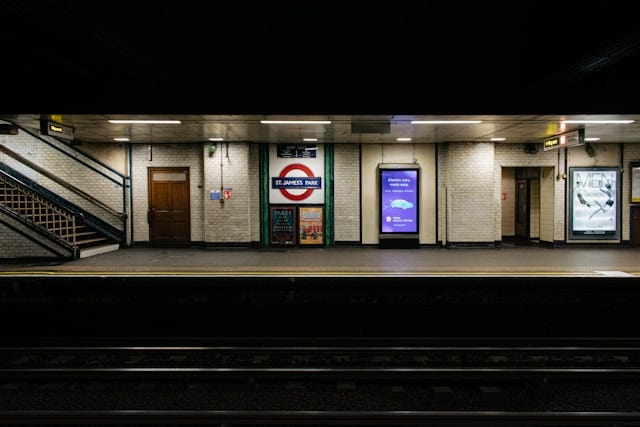Between Here and There, We Vanish
93% of an 18-year-old’s free time is projected to be spent online for the rest of their lives.
What makes travelling by overland train so unique is the relationship it creates between the traveller, time, and the act of moving. On a long train journey the sun crosses the sky, the landscape shifts, dinner is served while your bed is made in the sleeper carriage. As night falls over fir trees, you lie back and listen to the tracks clacking underneath, the motion rocking you to sleep.
Road trips are different. You feel time passing and space unfolding, but mostly you wish for the hours to vanish and the destination to come sooner.
Years ago, I lived in London. To navigate the city, I carried two maps: my mental map of islands stitched together by a Tube map. For me the city was broken into shards. Marble Arch delivered me to green parks and ornate fences. Oxford Circus: crowds, tight rooflines, stolen sky. In between, there was nothing. No transition. Travelling underground never felt like travel. It was teleportation. You disappeared into darkness and re-emerged somewhere else.

That’s how I imagine a cruise ship too: long stretches of nothing, punctuated by ports. Meals, pools, drinks and onboard “entertainment” pretend to be experiences, but only fill the emptiness between real places. The ship creates its own artificial rhythm to hide the void of travel.
We live like this now. Real moments demand our attention — then we dive back into our phones. Distraction floods every gap. We check notifications walking between rooms, scroll while waiting for lifts, refresh feeds during ad breaks. The spaces between experiences, once filled with wandering thoughts, chance observations and the simple act of being present have vanished into a blue glow.
That 93% says it all. A whole generation spending nearly all its free time inside digital spaces - distracted from life’s journey, missing the transitions, living by the artificial rhythms of algorithms instead of the natural rhythms of their own lives.
Before the internet, we had a name for empty moments: dead time. Waiting rooms where you stared at framed filler art. Commutes where your mind wandered. Doctor’s offices where you sat with your thoughts. Supermarket queues where you noticed the person ahead of you buying flowers and wondered about their day. These were spaces in your day where your mind breathed, where unexpected thoughts surfaced, and you stayed tethered to the world around you.
Now we’ve plugged every gap so completely that we don’t notice we’ve killed something essential. Our lives have turned into run-aground-cruise-ships; infinite entertainment masking the fact that we’re no longer really travelling anywhere.
Maybe we should call screen time what it really is.
Dead time.





Ugh!
I’d managed to go more than five years without having to look at a London tube station.
So, thanks for that.